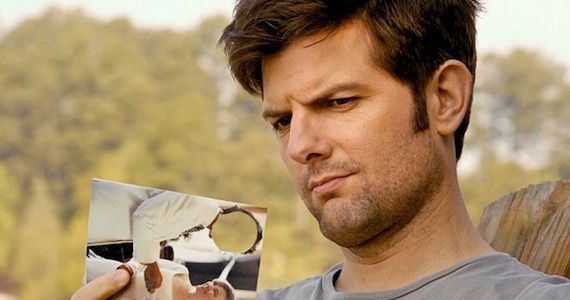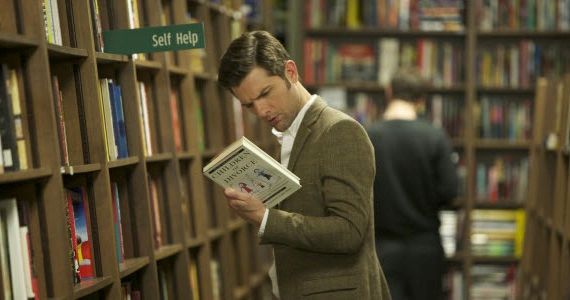A.C.O.D. is an entertaining but uneven story that is elevated by worthy performances from nearly everyone involved.
Adult Children of Divorce (aka A.C.O.D.) follows the story of Carter (Adam Scott) who, as long as he can remember, had to watch his eccentric and free-spirited parents fight - even after their marriage had already ended. The belittling and bickering continued even though his father Hugh (Richard Jenkins) and mother Melissa (Catherine O'Hara) had remarried but, over time, a tentative truce settled in - until Carter's younger brother Trey (Clark Duke) announces an impulsive engagement to his girlfriend, Kieko (Valerie Tian).
Trey hopes that both their mother and father will attend the wedding, despite their ongoing rivalry, and in order to help ensure his brother's happiness, Carter stages an intervention. In the process he discovers a long-kept secret from his childhood, one that causes him to rethink his journey to adulthood, his career, and his own love interest, Lauren (Mary Elizabeth Winstead) - while at the same time helping his brother plan the big wedding and manage any parental shenanigans.
Stu Zicherman makes his directorial debut on A.C.O.D. - which he co-wrote with Ben Karlin (Modern Family). Despite the indie approach on display for Adult Children of Divorce, movie fans might remember Zicherman as one of three writers (along with Zak Penn and Raven Metzner) who wrote the oft-derided Daredevil spinoff Elektra. Since that time, Zicherman has contributed to several ill-fated TV series (Six Degrees, Life Is Wild, and Lights Out) that were each limited to a single season. Still, the writer/producer's past shortcomings shouldn't necessarily mean that potential A.C.O.D. viewers should write the film off - as it's a solid (albeit flawed) indie movie offering. The central premise of the film is unique (as well as timely) and quality performances from Scott, along with veterans like Jenkins and O'Hara, make certain shortcomings forgivable. A.C.O.D. is not a career-defining indie film for Zicherman but it is a harmless and mostly entertaining attempt at exploring modern relationships.
The plot leans heavily on the notion that the current crop of 30-something adults are the least nurtured generation in ages - children of divorce, separation, and generally unhappy homes that are now struggling in their own attempts at intimacy. It's a sound foundation for storytelling, and Zicherman includes a variety of relationship dynamics to juxtapose, allowing for some interesting insight into the different ways that people attempt to find affection - especially those without idyllic childhoods.
Yet, while A.C.O.D. throws a lot of intriguing philosophical questions into the mix, grounded with charming and humorous character moments, the filmmaker falls short in his efforts to address many of these ideas or say anything new about adult children of divorce subjects. Ultimately, the story is contemplative and chaotic, much like real-life, but for all the pontificating, A.C.O.D provides few consequential takeaways that viewers can ponder once the film is over.
Nevertheless, performances are strong in the film - resulting in charming setups that work as standalone scenes even if the larger narrative is clumsy as a whole. Adam Scott presents a likable geeky guy routine that doesn't stray far outside of the actor's wheelhouse but is elevated by some noteworthy material to mine. Carter is a normal, albeit damaged, guy surrounded by significantly zanier family and friends - meaning that the best element of Scott's performance is how he adapts the character to a variety of situations and oddball personalities.
Much of A.C.O.D. sees Carter scrambling to hold his family together, while at the same time confronting his own issues, but a handful of interactions where the character is caught-off guard, forced to acknowledge the brokenness of life, give Scott (and his supporting cast) room to do something fresh.
To that end, it shouldn't come as a surprise that Richard Jenkins and Catherine O'Hara (not to mention Clark Duke) are reliable, effortlessly doling out life lessons and laughs. That said, it's Amy Poehler and Ken Howard, playing Carter's stepmother Sondra and stepfather Gary, respectively, that offer the most impactful moments. Poehler, especially, is playing against type in the A.C.O.D. - making it clear she's got more to offer than the over-the-top personality audiences now expect (ever since she became a standout on Saturday Night Live). Mary Elizabeth Winstead and Jessica Alba also deliver in their contributions - though both of their characters are mainly designed to be mirrors for Carter to examine his own life and choices.
Despite a likable and quirky role, Jane Lynch's part as Dr. Judith (child psychologist and author) is both instrumental in making A.C.O.D. distinct - while at the same time introducing a number of philosophical conundrums that Zicherman has trouble rectifying within onscreen drama. In an effort to tie the ideas together Lynch (and Jenkins) often wax-poetic on the subjects of life and love in emotionally engaging character beats, but the lessons are never really realized in the actions of the characters. Instead, viewers are being told what the principle players think - without ever seeing many of the notions put into meaningful (or entertaining) practice. In a more high-brow indie effort, the disconnect might work but A.C.O.D., more often than not, follows pretty standard romantic-dramedy tropes - meaning that certain viewers may not be prepared for (or satisfied by) the film's gradual shift into abstraction.
A.C.O.D. is an entertaining but uneven story that is elevated by worthy performances from nearly everyone involved. It's an interesting story that attempts to make sense of modern relationships - as well as the ripple effect they can have on others. However, scene-to-scene the movie does little more than point to its central characters, poking and prodding them into revealing their secrets, only to wrap the whole thing up in prosaic generalizations that lack worthwhile emotional payoff. In spite of good intentions, Zicherman fails to capitalize on his compelling "Adult Children of Divorce" platform to present viewers with equally captivating insights.
If you’re still on the fence about A.C.O.D., check out the trailer below:
-
[poll id="697"]
___
A.C.O.D. runs 95 minutes and is Rated R for language and brief sexual content. Now playing in theaters.
Let us know what you thought of the film in the comment section below.
Follow me on Twitter @benkendrick for future reviews, as well as movie, TV, and gaming news.




